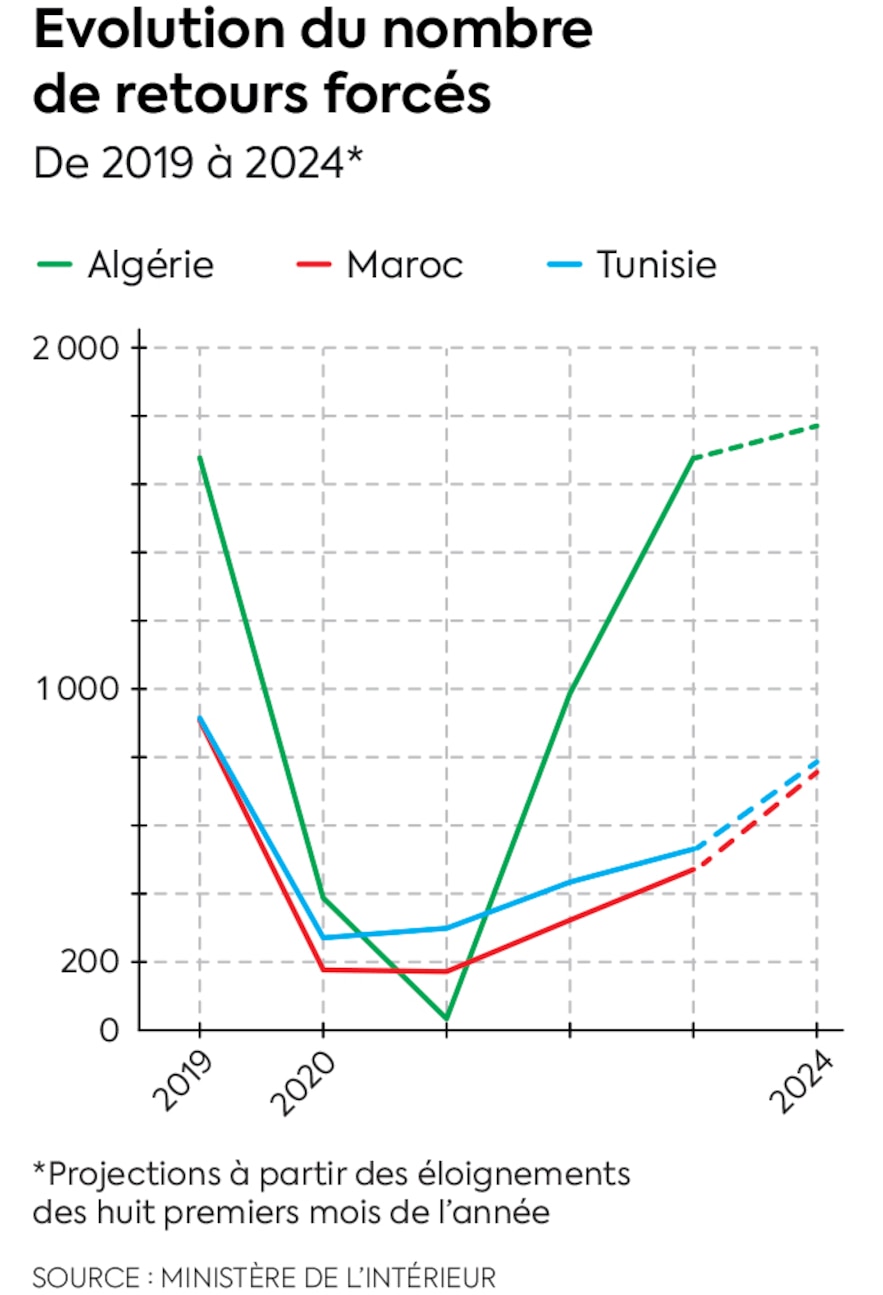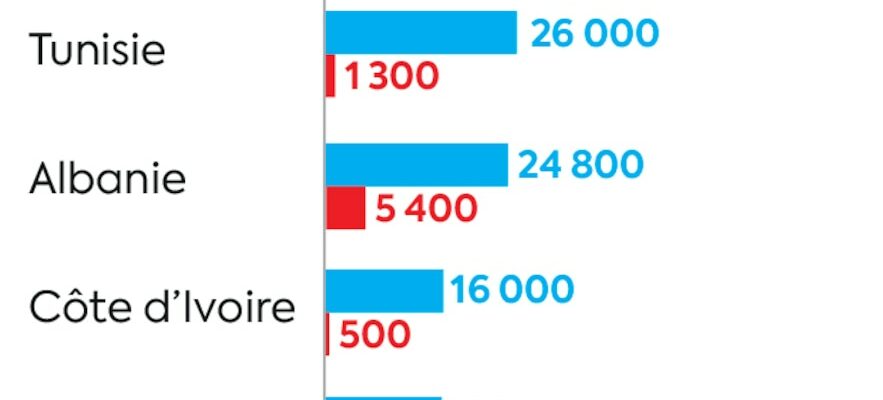This is the hidden story of a major diplomatic turnaround. On July 30, Emmanuel Macron recognized in a letter addressed to the King of Morocco that “the present and future of Western Sahara fall within the framework of Moroccan sovereignty”. Spectacular turn. Prudent French diplomacy had, until now, always taken care to spare both Algiers and Rabat in this seventy-year-old conflict. This shows that the negotiations preceding the French president’s declaration were numerous, precise, intense. For six months, the Quai d’Orsay and the Ministry of the Interior have been meeting with their Moroccan counterparts. At the center of these talks, Moroccans banned from staying in France, but still on the territory. “In the secret deal that we made with the Moroccan authorities on Western Sahara, we notably negotiated that they should take back more people under the obligation to leave French territory [OQTF] – and therefore give more consular passes [LPC]”, indicates a former senior official from the Ministry of the Interior present at these meetings.
This “deal” is essential for France: Rabat, at odds with Paris, is reluctant to grant the precious passes. This travel document is essential to send any foreigner back to their country of origin when they do not have a passport. Without agreement, it is impossible to execute the OQTFs, the person will be prohibited from entering the country, France will have to take them back. “It was part of the reestablishment of the relationship on both sides,” notes another participant in these meetings, this time on the Quai d’Orsay side. “There was no fixed quota for consular passes, but we asked for a commitment.” To help its prefects, Paris therefore agreed to return to a diplomatic position dating back to the mid-1950s. A sign of the explosiveness of the issue.
Morocco’s refusal
The question of these famous OQTFs came back to light after the murder of Philippine, found buried on September 21 in the Bois de Boulogne in Paris. The Moroccan Taha O., alleged murderer, had been subject to an OQTF since June 18, triggered two days before his release from prison, at the end of his sentence. A consular pass was indeed issued by Morocco, but only on September 4. Or two months later after the request from the prefecture. The same day, it was impossible to get hold of Taha O. The day before, the man had just been authorized by a judge to leave the center where he was being held, beyond the legal limit, the magistrate considered. Why didn’t the Yonne prefecture trigger the procedure before? “Consular passes can have a very short expiry date. If the administration had triggered the request earlier, we risked having an expired document even before the end of our sentence,” we argue in the entourage of the Minister of the Interior. Neither too early nor too late, the document must arrive on time. And it is in this management of timing that the tangle of French procedures and the multiplication of actors raise questions.
The prefecture initially received a refusal from the Moroccan consulate. The procedure was only relaunched a month later, in Paris, at the Ministry of the Interior, on July 16. The request is renewed on August 27. The minister’s entourage denies any error on the part of the prefecture – the approach “used initially was in conformity with the procedural note that the agents had”, it is indicated – but considers that “Morocco’s refusal has took time to be understood by the teams. A delay sufficient to stop the machine.
Investigation
France is chronically struggling to obtain these keys. Already, in 2020, a report from the Court of Auditors highlighted a removal procedure which “in reality comes up against impasses”. According to figures from a senatorial report dating from 2023, just over one in two passes (53.7%) were sent to France within a timely manner by the consular authorities in 2021. In January 2024, another report from the Court of Auditors pointed out that, between 2018 and 2022, “58% of releases from administrative detention centers [CRA] before expulsion resulted from decisions of the judicial courts, often due to an impasse in the issuance of consular passes”. Cases similar, therefore, to that of the alleged murderer of Philippine.
Emblematic, the case of the Yonne prefecture is not new. “Certain prefectures are less experienced in investigating such cases,” points out Fernand Gontier, central director of the border police from 2017 to 2022. In these cases, there is a greater risk of making mistakes.” Between 2019 and 2022, the department has, for example, issued “only” 1,437 OQTFs. Ten times less than the North (18,748) or Bouches-du-Rhône (17,605). So many requests for passes to be sent to the consulates of the countries concerned in France, after having clarified the nationality of the person to be expelled.
A heavy file
Several administrative burdens, including the absence of fingerprints to use in certain countries, lead to discouragement among prefectural agents. “The Pas-de-Calais prefecture, faced with difficult nationalities like Iran, no longer even asks for consular passes, says Fernand Gontier. This also happens with Vietnam, to a lesser extent.” However, the progress of the procedure must be closely monitored. If the administration does not provide proof that it has diligently contacted the consular authorities, its case becomes fragile. The incarcerated individual may be released, in particular because the courts consider that the case is clearly not urgent enough to focus the attention of the administration. “The teams panic when an individual detained in the CRA is presented before a magistrate,” observes a former Beauvau employee. “But often, the prefectures send their reminders to the consulates at the very last minute.”
Number of OQTFs and forced returns carried out.
© / THE EXPRESS
Staffing issues
In 2023, a very critical report from the Court of Auditors on “the capacity for action of prefects” highlighted “means that have become insufficient”. Between 2010 and 2020, nearly 5,000 jobs were lost in the prefectures. The rapporteurs highlighted the case of the Alpes-Maritimes, “one of the prefectures most affected by the increase in migratory flows”, whose management responsible for migration was faced with “a significant number of leaves and absences for long periods of time”. illness” and “an excessive proportion of short-term contract workers”. A damaging turnover as the relationship of trust with the consular authorities is crucial in obtaining passes.
But this confidence is of no use when countries simply do not want to take back nationals with an inglorious past. “Consulates do not have much goodwill in taking people under OQTF home when they have petty criminal profiles. Objectively, they have no interest in it,” remarks Xavier Driencourt, former French ambassador in Algiers. Faced with these difficult cases, requests from prefectures have long been centralized by the border police for around thirty countries, notably Bosnia-Herzegovina and Pakistan. “Relieving the prefectures”, the success rates of this route are “excellent”, with 91% obtaining consular passes in 2022, underlines a report from the Court of Auditors published in January. But the officials in question are not numerous enough to take charge of all the procedures.
Intelligence blackmail
In 2019, a “consular pass task force” was also created. Bringing together five Interior agents, supported by an ambassador in charge of migration, it takes over when the prefectures encounter refusals from consulates. With some success. “From around 50% in 2018, we rose to 67% the following year,” says Hugues Besancenot, former director of immigration at the general directorate for foreigners in France, who participated in the creation of the task force. By centralizing and allowing the prefectures to rely on us, the result is better.” In its January report, the Court of Auditors recommended increased centralization of the management of passes. “The suggestion is not necessarily well received in the prefecture, where we think that we want to take away their prerogatives. But it is a way of relieving them,” points out Fernand Gontier.
A response, too, to the hardening of countries. Since Covid, the execution of OQTFs has fallen, particularly in the Maghreb. Of 1,627 forced removals in 2019, Algeria ultimately carried out only 34 the following year. The same goes for Morocco, which went from 908 in 2019 to 177 in 2020, or Tunisia (from 915 to 271). In response, France restricted the granting of visas to Moroccans, Algerians and Tunisians in September 2021. The decision led Maghreb countries to transmit less information to Paris, particularly on Islamism. “When you are Minister of the Interior, you have the choice between improving your OQTF execution rate or preventing attacks. It is a very difficult decision,” argues a former member of Gérald Darmanin’s cabinet.

Evolution of the number of forced returns.
© / THE EXPRESS
Regular visits
Negotiations between Paris and the capitals of the Maghreb nevertheless continued. Those around Gérald Darmanin insist on his “regular” visits, particularly to Algiers, to negotiate the return of “dangerous personalities”. We also do not hesitate to criticize the Quai d’Orsay, considered to have little support on the issue. In its January report, the Court of Auditors regretted “insufficiently developed interministerial coordination, in particular with the Ministry of Europe and Foreign Affairs”. “The Quai has always been present at interministerial meetings with Beauvau. And we are mobilizing the ambassadors,” opposes a former member of Stéphane Séjourné’s cabinet. According to projections from the Ministry of the Interior, the number of forced removals should almost return to pre-Covid levels for Morocco and Tunisia, and exceed them for Algeria in 2024.
Many of these removals take place on board a commercial flight. They can also take place on board a special flight bringing together several nationals of the same country. A recurring practice with countries like Georgia, “there is a departure every two days to Tunisia, notes a senior Interior official. We were also able to make group flights with Algeria and Morocco.” In other cases, flights may even be organized by Frontex, the European agency responsible for the Schengen area borders. The same plane then picks up nationals of the same country at several European airports before flying to their original destination. But for this, you must already obtain passes.
.
